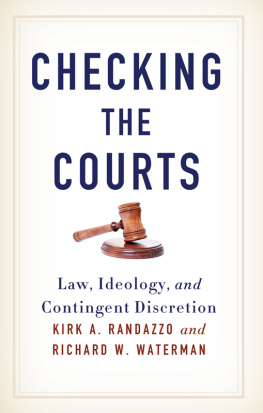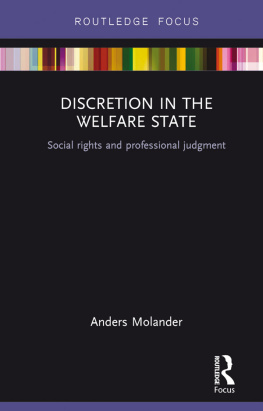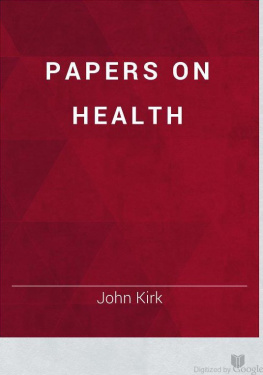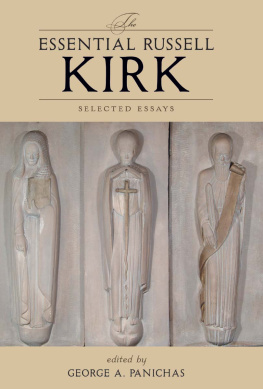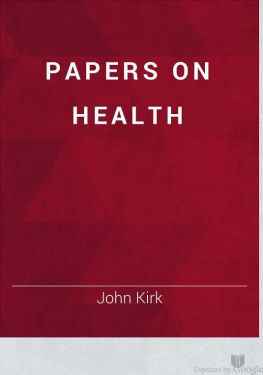Checking the Courts
SUNY series in American Constitutionalism
Robert J. Spitzer, editor
Checking the Courts
Law, Ideology, and Contingent Discretion
Kirk A. Randazzo
and
Richard W. Waterman
Published by State University of New York Press, Albany
2014 State University of New York
All rights reserved
Printed in the United States of America
No part of this book may be used or reproduced in any manner whatsoever without written permission. No part of this book may be stored in a retrieval system or transmitted in any form or by any means including electronic, electrostatic, magnetic tape, mechanical, photocopying, recording, or otherwise without the prior permission in writing of the publisher.
For information, contact State University of New York Press, Albany, NY
www.sunypress.edu
Production by Diane Ganeles
Marketing by Anne M. Valentine
Library of Congress Cataloging-in-Publication Data
Randazzo, Kirk A., author.
Checking the courts : law, ideology, and contingent discretion / Kirk A. Randazzo and Richard W. Waterman.
pages cm. (SUNY series in American constitutionalism)
Includes bibliographical references and index.
ISBN 978-1-4384-5287-6 (hardcover : alk. paper)
1. CourtsUnited States. 2. Judicial processUnited States. 3. Political questions and judicial powerUnited States. 4. Constitutional lawUnited States. I. Waterman, Richard W., author. II. Title.
| KF8700.R36 2014 |
| 347.73'12dc23 | 2013040987 |
10 9 8 7 6 5 4 3 2 1
Contents
Illustrations
Figures
Tables
Acknowledgments
As with any project of this magnitude, its completion would not be possible without the generous support and assistance from several individuals and sources. First, we are extremely grateful to the National Science Foundation for providing a grant (SES-0719328) to support substantial portions of this research. Second, we appreciate the research assistance provided by Jeffrey Fine, Michael Fix, and S. Andrew Martin. Third, we would like to thank the numerous departments, associations, and institutions who listened to presentations of the research. Previous versions of this manuscript were presented at annual meetings of the American Political Science Association (2004, 2005, 2006, 2007, and 2009), the University of Kentucky School of Law (2007), the Conference on the Seventh Circuit Court of Appeals at Southern Illinois UniversityCarbondale School of Law (2008), the annual meeting of the Southern Political Science Association (2009), the Empirical Implications of Theoretical Models Institute (EITM) at the University of Michigan (2009), the University of South Carolinas Department of Political Science (2011), the University of Alabamas Department of Political Science (2011), and the EITM Alumni Conference at the annual meeting of the Midwest Political Science Association (2012). We also wish to thank Michael Rinella, Senior Acquisitions Editor at SUNY Press, for all of his support and advice.
Additionally, we appreciate the many individuals who offered comments throughout the development of this research. Our sincere thanks to John Aldrich, Chris Bonneau, Bradley Canon, David Darmofal, Charles Finocchiaro, Richard Fording, Matthew Gabel, Elizabeth Gerber, Douglas Gibler, Robert Howard, Mark Hurwitz, Arthur Skip Lupia, Mark Peffley, Reginald Sheehan, Harold Spaeth, Donald Songer, Lee Walker, and Neal Woods. Though these individuals all contributed to the completion of this book, any errors or omissions are solely the responsibility of the authors.
appear in Political Research Quarterly .
Finally, Randazzo wishes to thank the Departments of Political Science at the University of South Carolina and the University of Kentucky for their support and encouragement throughout the project. He also wishes to thank his wife, Carol, and two children, Samuel and Anna, for their continued love and support. They constantly remind him of what is truly important and their smiles always brighten any day.
Richard Waterman thanks the University of Kentucky for its support. He also thanks his partner Sendil Nathan.
1
Introduction
Whoever hath an absolute authority to interpret any written or spoken laws, it is he who is truly the lawgiver, to all intents and purposes, and not the person who first spoke or wrote them.
Benjamin Hoadly, quoted in Carter and Burke (2002, 68)
This quotation raises an important and fundamental question concerning the development of law in the United States: from where does the law emerge? Benjamin Hoadlys statement indicates that the answer lies with courts and judges, since they possess the authority to interpret the law. Yet, the Constitution provides Congress with the authority to make the law. This overlapping Constitutional authority consequently creates an invitation to struggle (Corwin 1957, 171) between the legislature and the judiciary over who makes the lawthe Congress that writes statutes, or the courts that interpret them. the Court becomes a policymaker divorced from public will. Thus, from the earliest days of the United States through more recent years the question about the development of the law has perplexed legal experts and generated tension between the legislative and judicial branches.
In the last decade, this invitation to struggle became apparent during the confirmation hearing of John Roberts to replace the late William Rehnquist as Chief Justice of the U.S. Supreme Court. On the first day, Senator Arlen Specter (Chair of the Judiciary Committee) included the following statement in his opening remarks: Im very much concerned about what I conceive to be an imbalance in the separation of powers between the Congress and the court. I am concerned about what I bluntly say is the denigration by the court of congressional authority. John Roberts was confirmed as Chief Justice of the Supreme Court, in part, because these comments indicated to the U.S. Senate that he viewed a judges role as an applier of the rules and not as a legislator in judges robes. Stated another way, the statutes passed by Congress should receive substantial deference from judges and justices because those statutes are the law.
Similar to the Roberts confirmation, the question of who makes the law was a prominent issue during the confirmation hearing of Sonia Sotomayor to replace David Souter as an Associate Justice on the U.S. Supreme Court. During her opening remarks Judge Sotomayor stated, In the past month, many senators have asked me about my judicial philosophy. Simple: fidelity to the law. The task of a judge is not to make the law. It is to apply the law. Similar to the comments made by John Roberts during his confirmation hearing, Sonia Sotomayor repeatedly indicated that Congress was the branch constitutionally responsible for making the law, while the judiciary simply applied those rules to particular cases.
Anecdotal Evidence of Statutory Influence on Judges
The examples of the Roberts and Sotomayor confirmation hearings serve to illustrate the inherent tension between Congress and the courts over the law. Indeed, defining the lawmaking responsibilities of the legislative and judicial branches is a highly dynamic process sometimes overlooked by scholars of these institutions (Campbell and Stack 2001, xiii). Fisher (2001, 21) notes that although it is conventional to view the judiciaryand especially the Supreme Courtas the ultimate and final arbiter of constitutional law, numerous examples over two centuries suggest a more dynamic and less hierarchical model. This dynamic process is also observed by Paschal (1992) when he notes that there is a continuing colloquy between the legislative and judicial branches over the meaning of the law. This ongoing dialogue raises important questions for scholars of the judiciary. To what extent do legal factors (such as legislative statutes) influence the behavior of judges and justices?


